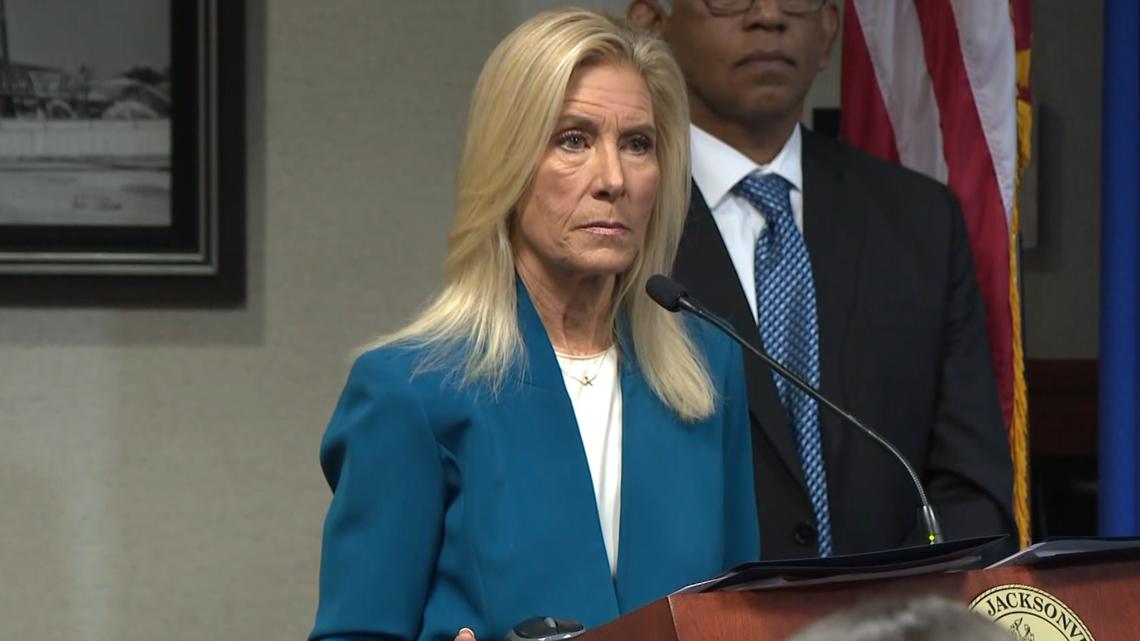Deegan says the agreement is standard to give outside auditors access to city data. The state’s CFO argues Florida DOGE isn’t required to sign any agreements.
JACKSONVILLE, Fla. — Jacksonville Mayor Donna Deegan said Tuesday that she has requested a meeting with the Florida chief financial officer after he claimed the city is interfering with the state’s Department of Government Efficiency (DOGE) audit by requiring the group to sign an agreement to access city data.
Jacksonville is one of several cities that Florida DOGE has identified for further financial review. Auditors are slated to be in Jacksonville for an onsite visit Thursday and Friday. The task force highlighted rising property values and annual property tax collections as a basis for the audit.
In a letter to Deegan on Monday, Florida CFO Blaise Ingoglia claimed that some government entities were requiring auditors to fill out documents that “limit the audit authority” of his office.
Deegan responded to Ingoglia’s remarks Monday, saying it is standard to require outside auditors to complete a one-page form to ensure that sensitive city data is protected.
Deegan said the city had requested Florida DOGE provide the number and names of people who need access to the city’s financial systems during the site visit this week.
View the technology agreement in question below:
“When we have our independent auditors who come in here every year, we are bound by state law to have them sign off on, not this particular agreement, but an agreement to make sure we are protecting our data, to make sure that if there’s a breach, there’s an agreement there,” Deegan said during a news conference Tuesday. “I don’t really understand what the controversy is here.”
However, Ingoglia said such documents waste time and argued that all the requested information is public, and therefore, the state doesn’t need to follow the city’s conditions to retrieve public documents. He then reminded the mayor of his authority to demand answers from any person related to the audit.
“These types of documents slow and impede the important work of the auditors and are nothing but roadblocks to the transparency that Floridians deserve,” Ingoglia said in the letter. “I will not hesitate to use this authority, to the maximum extent allowed by law, to provide accountability to Floridians, especially if I continue to be met with resistance.”
Ingoglia posted on X about the incident, asking Deegan, “What are you trying to hide?”
Deegan contended that the city wants to work with the state, and she is hopeful the situation will be resolved before the Florida DOGE team arrives in Jacksonville.
“We have not denied access to any data, nor are we going to deny access to anything. We want to work with our partners at the state,” she said. “I hope we can have a conversation and resolve it. Either way, the state will certainly have access to all the data that they want to have access to.”
Deegan said the City of Jacksonville already conducts self-imposed audits each year, has outside auditors and the Duval DOGE special committee has also put city spending under a microscope.
“But at the end of the day, if this is something that the state wants to do, we’re happy to provide them with what they want,” Deegan said. “I think they’re gonna find a very fiscally responsible, successful financial picture, so I don’t have any reason to not want them to see that.”
The mayor said that since the city was notified last week, city staff have spent hundreds of hours preparing for the state’s audit while in the middle of the annual budget review.
“We already have dozens of employees in the city that are spending hundreds upon hundreds of hours collecting all of this data for the state,” Deegan said. “Frankly, in my mind, they could be working for our citizens with that time.”
“We are, by the way, tracking those hours,” she added.
